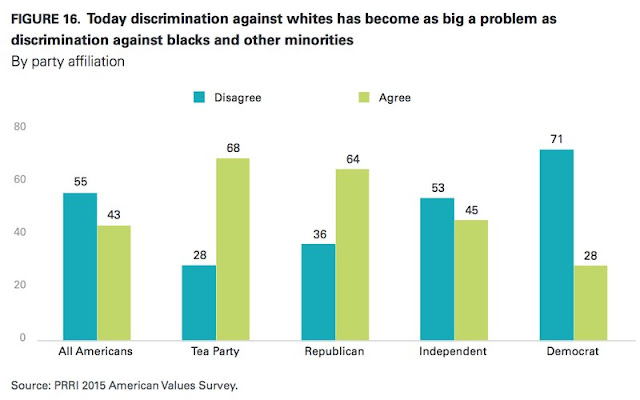Naomi Murakawa. The First Civil Right: How Liberals Built Prison America
Leah Gordon. From Power to Prejudice: The Rise of Racial Individualism in Midcentury America
Reuel Schiller. Forging Rivals: Race, Class, Law, and the Collapse of Postwar Liberalism
Daniel Martinez HoSang. Racial Propositions: Ballot Initiatives and the Making of Postwar California
Daryl Michael Scott. Contempt and Pity: Social Policy and the Image of the Damaged Black Psyche, 1880-1996
Yet it would be naive to suggest that racism is an equal problem in all political parties at all times. Even though no major American political party has ever been willing to stand unequivocally against White supremacy, at various times one or the other party tends to be the lesser of two evils. The Democratic Party circa 1864, for example, was a worthless and execrable institution, while the Republican Party, despite its inability to imagine real equality, at least wanted to end slavery.
Even if scholars are a bit bored of the fact that the contemporary Republican Party is racist in a way that the Democratic Party is not, the reaction to Donald Trump's rise is a reminder that what is common to knowledge to us is not necessarily well-known to the public. So perhaps we do need to speak up. First, let's just establish the point that the GOP has a severe problem with racism:
There are dozens of data points we might offer as evidence, but I think this is one of the best. It's a simple statement, easy to understand, and because you have to deny reality in order to agree with it, it's an effective proxy for measuring racial ignorance and racism. Notice, again, that this is a bipartisan problem. Nearly a third of Democrats agree with the statement. But you can see that Republicans have a much more severe problem. Nearly two-thirds embrace a view of American society that is intellectually and morally unsupportable.
You can see this by many other measures too. For example, even attitudes toward interracial marriage have a partisan gap. I'll just note one more. The racial resentment scale that many political scientists use shows how white resentment has become less bipartisan in recent decades and has become increasingly concentrated in the Republican Party.
My intention is not to beat up on the Republican Party. These partisan differences have ebbed and flowed over time. But we do need to grapple with where the problem predominantly exists right now.
I raise this point because I'm concerned that though most Republicans desperately want to stop Trump, they don't appear to have a plan to build their party anew on a less racist foundation. Even now, amid all the denunciations of Trump, the other candidates continue to play to the racism of the base. To understand this, we need to pay attention to what they're not saying.
A few weeks ago, when Marco Rubio finally decided to attack Donald Trump, he got down in the gutter with him, making jokes and personal attacks. He justified this on the grounds that policy attacks didn't seem to stick, and it was the only way to get the media to pay attention. He didn't want to do it, but it was the only option he had, right?
In fact, there has been another attack available to Rubio, Cruz, and Kasich all along, and they could make it without descending to Trump's level or engaging in crude insults or name-calling. This particular attack would also have the virtue of being true. Most important, if made forcefully and unequivocally, this attack would have dominated the news and made headlines for Rubio's campaign. It would go something like this:
"Donald Trump is using racism and bigotry to win votes. It doesn't matter to me whether Donald Trump is a racist in his heart, or is merely playing one on TV. His words are a disgrace to our party and our country, and it is an embarrassment to share a stage with him. I denounce his racism and will campaign against him if he were to be the Republican nominee."This would have been the appropriate response from the beginning of Trump's campaign. Remember, he was the most famous provocateur of the birther movement. Then he launched his campaign by calling Mexicans rapists. The other candidates should have pursued this line of attack at the first Republican debate. The point is, if the GOP was as innocent as its leaders claim, this would not have been a hard attack to make! There wouldn't be any downside. But the other candidates can't make this attack because, in the end, they need Trump's voters! And they know that most Republicans, including a substantial number of their own supporters, believe Whites are the primary victims of racism. They know that speaking bluntly against racism will not be received positively by most Republican voters.
The problem is deeper than Trump. And though the Democrats are not as egregious, they have their own problems. The front-runner has expressed her utmost confidence in Rahm Emmanual. She and Bernie have to be pressured and cajoled to support basic justice for people of color. Because so many people of color are in the Democratic coalition, there is a moderating effect. Even though Democrats don't dare to run on an explicit platform of tearing down White supremacy, they do have to be somewhat attentive to minority concerns. In the nearly all-White GOP, the moderating effect is almost non-existent. What Trump shows is that it may be possible to win the Republican nomination while running as a racist. Is it possible to win the Republican nomination while running unequivocally as an anti-racist? None of the other candidates have dared to test that proposition.


No comments:
Post a Comment